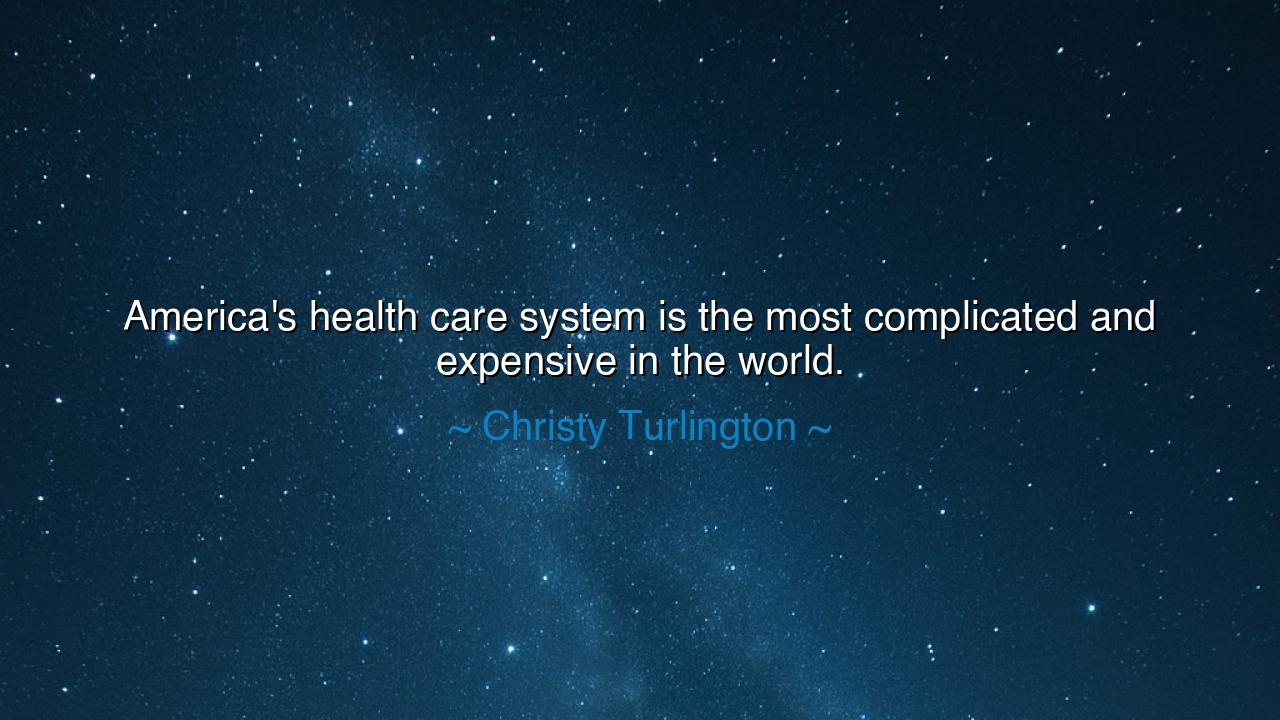
America's health care system is the most complicated and






In the clear and sobering words of Christy Turlington, we are given a truth that echoes through the chambers of both compassion and reason: “America’s health care system is the most complicated and expensive in the world.” Though spoken plainly, these words reveal the deep struggle of a nation whose brilliance in medicine has not always been matched by fairness in access. They carry the weight of sorrow and the tone of urgency, for they are not the words of a critic from afar, but of a woman who has seen the human cost of complexity — a mother, advocate, and witness to how systems meant to heal can, at times, wound through neglect and inequity.
From the time of the ancients, healers were revered not only for their skill but for their simplicity of purpose — to restore life and alleviate suffering. The Hippocratic Oath, sworn by physicians of old, bound the healer to compassion, not profit. But as civilizations grew, so too did their institutions; and with bureaucracy came barriers. Turlington’s reflection on the American health care system is the lament of one who sees how an empire of innovation — home to the most advanced hospitals and the brightest minds — can also become a labyrinth where the sick wander in confusion, trapped between cost and care. She speaks of the irony that the land of abundance often delivers health through hardship, where even healing is bought at a price beyond gold.
The origin of her words lies in both personal experience and public service. Christy Turlington, once known for the world of fashion, turned her life toward advocacy after facing a life-threatening childbirth complication. Through her organization, Every Mother Counts, she has walked among women across the globe — in Tanzania, Guatemala, and the United States — witnessing how the most natural act of giving life can become perilous when health care is denied or delayed. Her words are born not from theory, but from the lived truth that access to care should be universal, yet in America, it is too often a privilege. When she calls the system “complicated and expensive,” she speaks not in metaphor but from the stark reality of millions who must choose between health and livelihood.
Consider, for a moment, the story of Mary Harris “Mother” Jones, who in the early twentieth century stood before crowds of miners and their families, crying out against the neglect of working people. She called attention to how the poor lived and died in the shadows of wealth, their health sacrificed to greed. Today, though the tools have changed, the struggle remains. The complexity of America’s health system — its forms, fees, and failures — often burdens those already weary from poverty or illness. It is a new kind of injustice, veiled not in cruelty, but in confusion, not in chains, but in cost.
Turlington’s message also speaks to the spiritual poverty that arises when care is reduced to commerce. In ancient times, healing was sacred — a gift exchanged between humanity and the divine. The temple was the hospital, and compassion the medicine. But in the modern world, healing has become an industry, and in its vast machinery, the individual soul is too often forgotten. A system that measures life in dollars and complexity risks losing its moral compass. For what is the worth of technological progress if it cannot reach the suffering child, the expectant mother, or the elderly poor?
Yet, her words are not condemnation alone — they are also a call to reform and renewal. Complexity can be untangled, and cost can be rebalanced when empathy is restored to the center of policy. Turlington reminds us that simplicity in health care does not mean lack of sophistication; it means clarity of purpose. When a nation ensures that every citizen can receive care without fear of debt or denial, it has fulfilled not only a civic duty but a moral one. True strength lies not in wealth amassed, but in lives preserved.
Let this, then, be the lesson carried forward: health care must return to its sacred roots. To the policymakers, remember that behind every statistic lies a story, behind every bill, a beating heart. To the healers, recall that your art is not of numbers, but of mercy. And to the people, demand simplicity where confusion reigns, and justice where profit blinds. For as Christy Turlington teaches, the measure of a civilization is not in its inventions, but in its compassion — not in the cost of its hospitals, but in the reach of its healing.
And so, O listener, remember: a system that serves all serves best. Let health be not the privilege of the few, but the birthright of every soul. For when a nation heals its people freely and fairly, it not only cures their bodies — it restores its own humanity.






AAdministratorAdministrator
Welcome, honored guests. Please leave a comment, we will respond soon